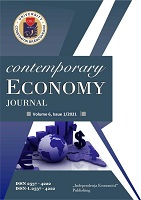APPLICATION OF INTERNATIONAL FINANCIAL REPORTING STANDARDS. EQUITY CONSIDERATIONS
APPLICATION OF INTERNATIONAL FINANCIAL REPORTING STANDARDS. EQUITY CONSIDERATIONS
Author(s): Nicoleta PavelSubject(s): Economic policy, Accounting - Business Administration, EU-Legislation, Commercial Law
Published by: EDITURA INDEPENDENŢA ECONOMICĂ
Keywords: equity; financial concept of capital; reserves; equity adjustments; compound financial instruments;
Summary/Abstract: The analysis of equity information submitted by entities in the annual financial statements allows information users to assess the objectives and policies adopted by entities on capital management. Equity information is presented in the Statement of Financial Position, the Statement of Change in Equity and the notes accompanying the financial statements. While matters relating to the recognition, valuation and presentation of assets and liabilities in annual financial statements are subject to specific accounting standards, equity issues are not subject to a specific standard, which are dealt with in the General Conceptual Framework and in some accounting standards. The General Conceptual Framework defined the concept of capital and the maintenance of financial capital, and in IAS 32"Financial instruments: presentation", IAS 29"Financial reporting in hyperinflationary economies", IAS 1"Presentation of financial statements" and other standards are prescribed criteria for the recognition, valuation and presentation of equity items. Some equity items such as equity and repurchased reserves, own shares are subject to national legal regulations. Information on the existence of reserves recognised under the legal provisions or restrictions on the distribution of equity items to owners is of interest to users. After Romania's accession to the EU, there was an extensive process of modernisation of legislation covering both company law and accounting rules in terms of eliminating any legal provisions that would have limited the functioning of companies in a competitive environment. Entities whose securities are traded on a regulated market and some entities with full or majority state capital apply the International Financial Reporting Standards as an accounting basis. With some exceptions, the transition of these entities to International Financial Reporting Standards has not significantly affected the total equity highlighted under accounting rules in line with European directives. The main changes in the equity structure were determined by the adjustment to inflation according to IAS 29"Financial reporting in hyperinflationary economies" and adjustments made as a result of the first application of the International Financial Reporting Standards. The interpretation of the equity information presented in the financial statements should be carried out in the context of the provisions of the relevant accounting standards and national legislation.
Journal: REVISTA ECONOMIA CONTEMPORANĂ
- Issue Year: 6/2021
- Issue No: 4
- Page Range: 110-117
- Page Count: 8
- Language: English

